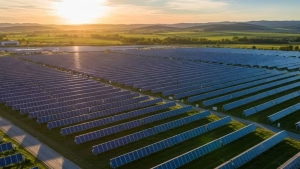Context:

The Government of India is planning to promote the PM-KUSUM (Pradhan Mantri Kisan Urja Suraksha evam Utthan Mahabhiyan) scheme in African and island countries as part of its international solar energy cooperation efforts.
Key Highlights / Details:
- The initiative will be showcased at the International Solar Alliance (ISA) General Assembly, scheduled later this month.
- The ₹34,000-crore PM-KUSUM scheme aims to enhance farmers’ energy security and promote clean energy through decentralized solar energy systems.
- The scheme targets setting up 10 GW of solar power plants on barren or fallow land and installing 20 lakh standalone solar pumps and 15 lakh grid-connected pumps.
- As of September 30, 2024, over 3.96 lakh solar pumps had been installed.
- A new goal of 348 GW solar capacity by March 2030 has been set under India’s broader renewable energy commitments.
- The expansion to African and island nations aligns with India’s aim to strengthen South-South cooperation and share sustainable development models.
Relevant Prelims Points:
- PM-KUSUM Components:
- Component-A: Solar power plants (up to 2 MW capacity).
- Component-B: Standalone solar pumps.
- Component-C: Solarisation of grid-connected pumps.
- Implementing Ministry: Ministry of New and Renewable Energy (MNRE).
- Nodal Agency: State Renewable Energy Departments and DISCOMs.
- ISA Headquarters: Gurugram, Haryana.
Relevant Mains Points:
- Promotes energy self-sufficiency among farmers and reduces dependence on diesel.
- Contributes to SDG 7 (Affordable and Clean Energy) and SDG 13 (Climate Action).
- Strengthens India’s renewable energy diplomacy and climate leadership.
- Facilitates technology transfer and capacity building for developing nations.




